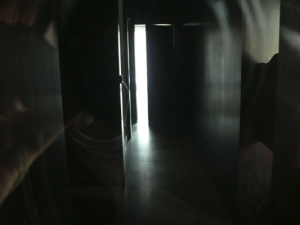A threshold concept is a core concepts which, once understood, transforms perception of a given subject, phenomenon, or experience. Its acquisition is inherently difficult. Metaphorically it involves being stuck by repeatedly bumping into a threshold until one manages to overcome the threshold. Other metaphors used are portal and liminal space, opening up a new and previously inaccessible way of thinking about something. The term threshold concept was coined by Jan Meyer and Ray Land.[1]
Like Decoding the Disciplines and Perkin's notion of troublesome knowledge, threshold concepts are a theory of difficulty, i.e. a theory explaining aspects of learning and teaching by focussing on difficulties inherent to them.[2]
Properties of threshold concepts
Threshold concepts typically have the following properties:[1]
- transformative: Once a threshold concept has been understood, it can change the perception of a subject or part of it.
- irreversible: The change in perspective that the acquisition of a threshold concept entails is difficult to forget or can only be unlearned again with considerable effort.
- integrative: Threshold concepts reveal previously hidden connections.
- bounded: Every concept has boundaries with thresholds to neighboring new conceptual areas.
- troublesome: The internalisation of concepts is troublesome for a variety of reasons. Concepts can seem strange, implicit, conceptually difficult, counter-intuitive or characterized by over-complexity.
Threshold concepts are not only discussed for students who are familiarising themselves with a subject, but also for teachers and their understanding of teaching processes. According to Meyer and Land the idea of threshold concepts is a threshold concept by itself.[3]
Give example of threshold concept
Relation to Decoding the Disciplines
Threshold Concepts and Step 1 Identify bottlenecks of Decoding the Disciplines both use theories of difficulty (Perkins, 2007) and focus on the hurdles of content. They both foreground the aspects of learning that prove consistently troublesome to uncover the tacit or “secret knowledge” of the discipline. Theories of difficulty design the challenge, but do not solve them. The main way the two theories differ is that Decoding the Disciplines from the start had a second theoretical component. Decoding Steps 3-4-5-6 navigate the problem using pedagogical theory. These Steps organize teaching and learning processes for good results, scaffolding instructional techniques to foster learning (Perkins, 2007). “The great strength of decoding is the methodology that undergirds the theory…,” (p. 41, Shopkow & Middendorf, 2019).
In categorial terms every threshold concept is a bottleneck while not every bottleneck is a threshold concept.
Shopkow [4]. Threshold concepts are the paradigm-shifting kinds of bottlenecks (Middendorf, 2025).
Shopkow, L., & Middendorf, J. (2019). CAUTION! THEORIES AT PLAY! Threshold concepts and Decoding the Disciplines. In J.A Timmermans & R. Land (Eds.) Threshold concepts on the edge. Leiden: Brill/Sense, pp. 37-50.
Middendorf, J (2025 in press). The Theory Bottleneck and Decoding the Disciplines. Die Hoschudt
Perkins, D. (2007). Theories of difficulty. In N. Entwistle, & P. Tomlinson (Eds.), Student learning and university teaching (pp. 31–48). Leicester: British Psychological Society.
See also
References
- ↑ 1.0 1.1 Meyer J H F and Land R 2003 "Threshold Concepts and Troublesome Knowledge: Linkages to Ways of Thinking and Practising" in Improving Student Learning: Ten Years On. C. Rust (Ed), OCSLD, Oxford.
- ↑ Pace, D. (2017): The Decoding the Disciplines Paradigm: Seven Steps to Increased Student Learning. Bloomington: Indiana University Press, p. 21
- ↑ J. H. F. Meyer, R. Land: Threshold concepts and troublesome knowledge (2): Epistemological considerations and a conceptual framework for teaching and learning. In: Higher Education. Band 49, Nr. 3, 2005, S. 373–388
- ↑ Shopkow, Leah (2010). “What ‘Decoding the Disciplines’ has to offer ‘Threshold Concepts,’” in Threshold Concepts and Transformational Learning, ed. Jan H. F. Meyer, Ray Land, & Catherine Baillie (Rotterdam: Sense Publications), 317-32.
